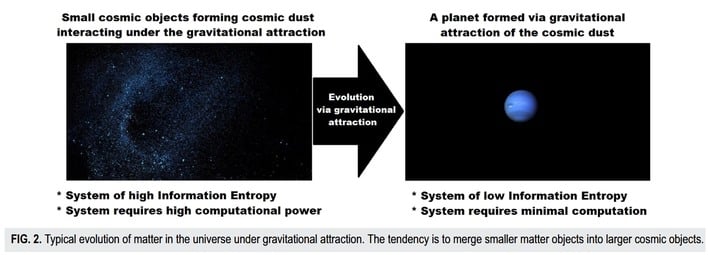File this one under "fun to think about, probably not changing your day job": a new study just dropped that suggests
gravity itself might be the smoking gun that our entire universe is one big computational simulation. Yep, we're talking simulation theory again — the idea that reality is just a very elaborate piece of code running on some cosmic mainframe. And this time, the argument isn't philosophical navel-gazing or sci-fi speculation, but a physics paper with some serious math under the hood.
The study, published in AIP Advances by physicist Melvin Vopson, leans on something called the "second law of infodynamics" — basically, a rule that says information entropy (a measure of randomness or disorder in information) tends to decrease in isolated systems. That sounds like the opposite of the second
law of thermodynamics, which says physical entropy tends to increase, but stay with us.
Vopson argues that in an informational universe, things like matter and motion exist in a kind of cosmic database, and gravity shows up as a kind of data optimization routine. Matter clumps together not because of some innate force, but because it makes the "simulation" easier to compute.
To make his case, Vopson walks through how you can derive Newton's law of gravity from information theory alone. In his model, space is made of tiny discrete cells (think pixels), each holding a bit of information. When you scatter particles in this pixelated space, the information entropy goes up. But if the particles move toward each other and merge, entropy drops. The result? An emergent attractive force that just happens to look exactly like gravity.
This might sound a bit like Erik Verlinde's entropic gravity theory, and you'd be right; Vopson acknowledges the similarity, but he takes it a step further by tying it directly into a
computational framework and arguing that gravitational behavior is actually an optimization step in a giant cosmic codebase. In other words, gravity is what happens when the universe tries to clean up its data structures.
So, is
this study proof we're living in the Matrix? Not quite. The study's math checks out in a toy model kind of way, but turning that into a full theory of quantum gravity or a testable prediction is still light years off. It's a fascinating twist on the simulation argument that gives the idea a little more scientific meat, though. Whether you buy it or not, it's hard not to appreciate the audacity of claiming that gravity—the thing that keeps your coffee in the cup—might be evidence we're all just bits in a beautiful, terrible machine.



